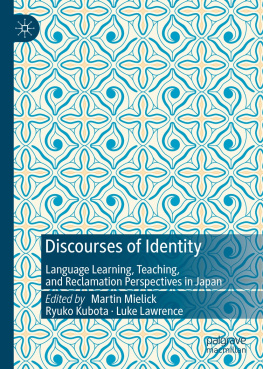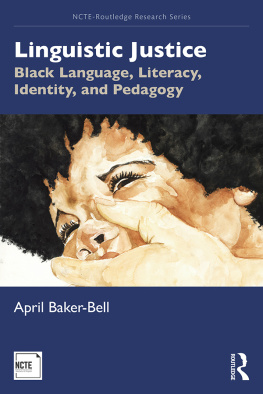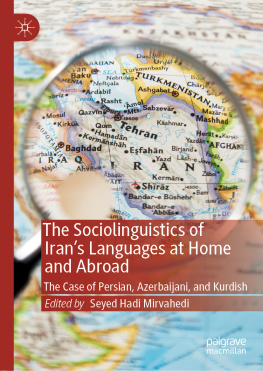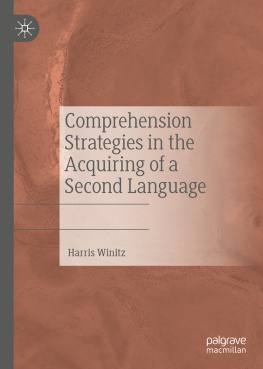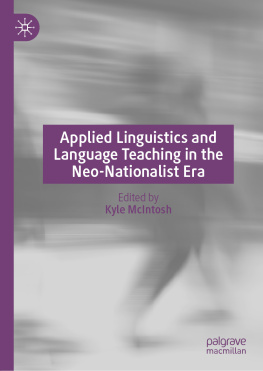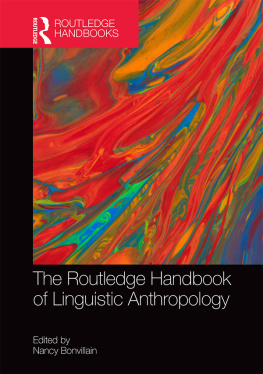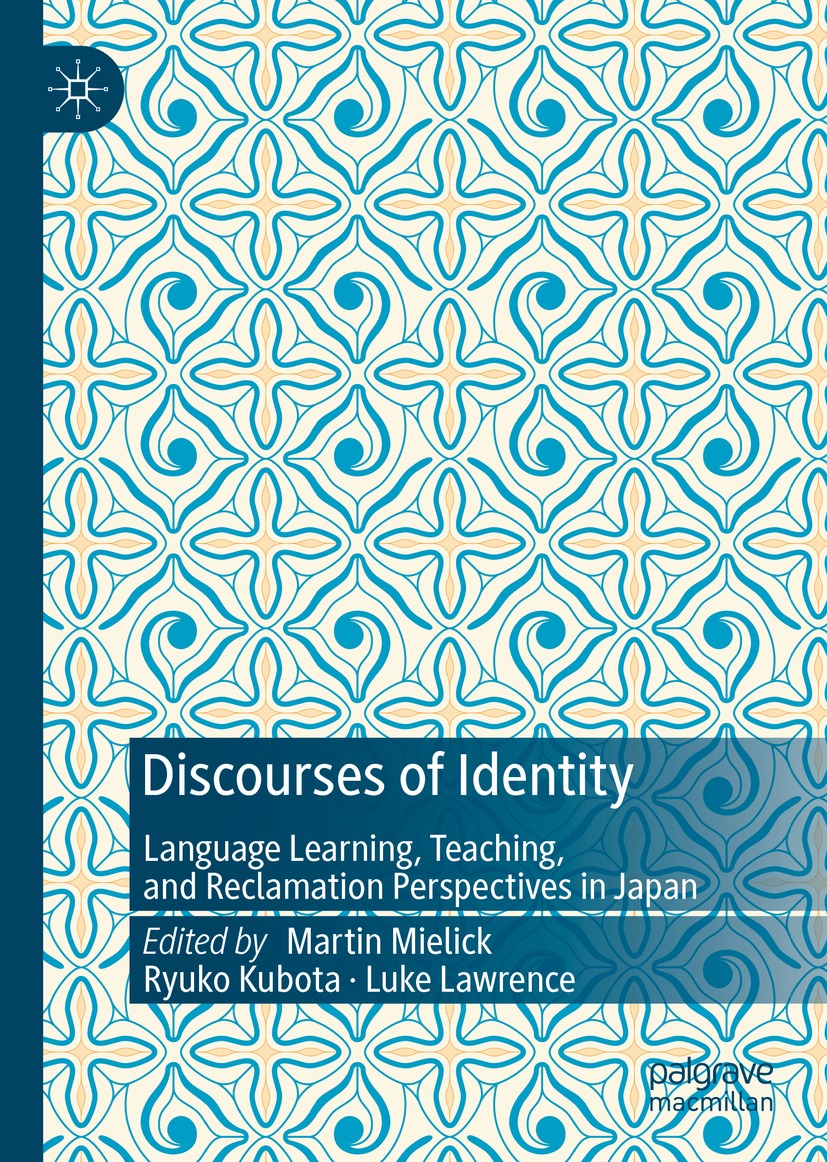Editors
Martin Mielick , Ryuko Kubota and Luke Lawrence
Discourses of Identity
Language Learning, Teaching, and Reclamation Perspectives in Japan

The Palgrave Macmillan logo.
Editors
Martin Mielick
Canterbury Christ Church University, Canterbury, UK
Ryuko Kubota
University of British Columbia, Vancouver, BC, Canada
Luke Lawrence
Toyo University, Tokyo, Japan
ISBN 978-3-031-11987-3 e-ISBN 978-3-031-11988-0
https://doi.org/10.1007/978-3-031-11988-0
The Editor(s) (if applicable) and The Author(s), under exclusive licence to Springer Nature Switzerland AG 2022
This work is subject to copyright. All rights are solely and exclusively licensed by the Publisher, whether the whole or part of the material is concerned, specifically the rights of translation, reprinting, reuse of illustrations, recitation, broadcasting, reproduction on microfilms or in any other physical way, and transmission or information storage and retrieval, electronic adaptation, computer software, or by similar or dissimilar methodology now known or hereafter developed.
The use of general descriptive names, registered names, trademarks, service marks, etc. in this publication does not imply, even in the absence of a specific statement, that such names are exempt from the relevant protective laws and regulations and therefore free for general use.
The publisher, the authors, and the editors are safe to assume that the advice and information in this book are believed to be true and accurate at the date of publication. Neither the publisher nor the authors or the editors give a warranty, expressed or implied, with respect to the material contained herein or for any errors or omissions that may have been made. The publisher remains neutral with regard to jurisdictional claims in published maps and institutional affiliations.
This Palgrave Macmillan imprint is published by the registered company Springer Nature Switzerland AG
The registered company address is: Gewerbestrasse 11, 6330 Cham, Switzerland
This book is a welcome addition to the literature on linguistic diversity in Japan, putting a solid nail into the coffin of the surprisingly persistent stereotype of Japan as a monolingual nation. Its multi-faceted examination of identity-related issues inherent in language learning, teaching and reclamation illuminates the true complexity of language issues in Japan today.
Nanette Gottlieb, The University of Queensland, Australia, Emeritus Professor, School of Languages and Cultures, nanette.gottlieb@uq.edu.au
If, in 2022, anyone is still holding onto the myth of Japan as a homogeneous nation, this book will shatter that myth. But not only that, this book also illuminates the experiences of those who are trying to negotiate diverse identities and carve out a place for themselves in a nation thats both rapidly changing and stubbornly resistant to change.
Yasuko Kanno, Boston University, USA, Associate Professor of Language Education and Chair of the Department of Language and Literacy Education, yakanno@bu.edu
Diversity and identity are concepts that are absolutely central to any understanding of language and its use. This wide-ranging volume explores the implications this has for language education in Japan, a country often portrayed as culturally and linguistically homogenous. In doing so, the book offers an insightful and engaging look at the experiences and challenges involved in real peoples often complex relationships with language education.
Philip Seargeant, The Open University, UK, Senior Lecturer in Applied Linguistics, philip.seargeant@open.ac.uk
Contents
Ryuko Kubota
Part IEnglish Language Learner Identity
Martin Mielick
Daniel Hooper
Xinqi He
Part IIIndigenous Language Reclamation and Identity
Yumiko Ohara and Yuki Okada
Tatsiana Tsagelnik
Madoka Hammine
Patrick Heinrich and Giulia Valsecchi
Part IIIJapanese Language Learner Identity
Chiharu Shima
Kazuhiro Yonemoto
Keiko Kitade
Noriko Iwasaki
Kyoko Motobayashi
Part IVEnglish Language Teacher Identity
Ashley R. Moore
Misako Tajima
Robert J. Lowe
Luke Lawrence
Sam Morris
Yuzuko Nagashima
List of Figures
List of Tables
Notes on Contributors
Madoka Hammine
works as an associate professor in the Faculty of International Studies at Meio University, Japan. She holds a doctorate degree from the University of Lapland in Finland. Her research focuses on teacher education, language education, Second Language Acquisition (SLA) and Indigenous research methodologies. She has been learning the linguistic varieties of Ryukyuan.
Xinqi He
is a lecturer at J. F. Oberlin University in Japan and holds a PhD from the University of Tokyo. She did her masters thesis in the same university in the field of applied linguistics yet shifted her academic focus to the field of critical applied linguistics in her PhD program, especially on migrants language acquisition.
Patrick Heinrich
is Professor of Sociolinguistics and Japanese Studies at the Department of Asian and Mediterranean African Studies at Ca Foscari University of Venice. Before joining Ca Foscari in 2014, he taught at universities in Germany (Duisburg-Essen University) and Japan (Dokkyo University) for many years.
Daniel Hooper
is a lecturer in the Education Department at Hakuoh University. He has taught in Japan for 16 years, predominantly in higher education and English conversation schools. His research interests include learner and teacher identity, communities of practice, and the English conversation school industry.
Noriko Iwasaki
is Professor of Japanese Language Pedagogy and Second Language Acquisition at Nanzan University. Her research interests include study-abroad students development of pragmatic competence and changes in linguistic/cultural identities and L2 speakers use of Japanese mimetics. She co-edited a volume titled Ido to Kotoba (Mobility and Language) (2018).
Keiko Kitade
is Professor of Japanese Language Teacher Education and Intercultural Communication in the Department of Letters and Graduate School of Language Education and Information Science, Ritsumeikan University, Japan. Her current interests are the narrative inquiry of study/work-abroad experiences, curriculum development in border-crossing learning, and language teacher development.
Ryuko Kubota
is a professor in the Department of Language and Literacy Education at University of British Columbia, Canada. She has taught Japanese and English as a foreign language. Her research focuses on antiracism, critical multiculturalism, and other critical issues in language teaching and learning.
Luke Lawrence
is a lecturer at Toyo University. His research interests revolve around intersectional aspects of teacher identity. His work has been published in

